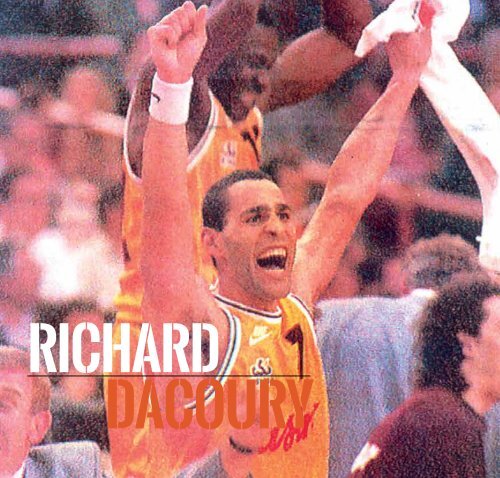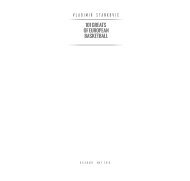RICHARD DACOURY - 101 Greats of European Basketball
Create successful ePaper yourself
Turn your PDF publications into a flip-book with our unique Google optimized e-Paper software.
Richard<br />
Dacoury<br />
87
Pr<strong>of</strong>essional<br />
winner<br />
The best way for me to start this story,<br />
which is dedicated to – if not the best,<br />
then the most decorated French player <strong>of</strong><br />
all time (not including active players) – is<br />
a detail that Boza Maljkovic, the boss <strong>of</strong><br />
Limoges in the early 1990s, told me in<br />
October 2012.<br />
“When I arrived to Limoges, I had to build a new<br />
team from scratch,” Maljkovic said. “For different reasons,<br />
<strong>of</strong> the eight players that finished that season,<br />
only one was expected to stay for the following season,<br />
Richard Dacoury. He was a player I liked a lot because<br />
<strong>of</strong> his physical potential, his willingness to work, his<br />
strong winning character and a personality that is always<br />
welcome in any locker room. Also, he spoke good<br />
English, which was important to interact with Michael<br />
Young and Jure Zdovc, our foreigners back then.<br />
“One day, I was told that we had to go to some<br />
school that was to take the name <strong>of</strong> Richard Dacoury<br />
because he had decided to ... retire! It was hard for me to<br />
convince him not to do that. He was about 32 years old<br />
and thanks to his physical condition, he still had some<br />
basketball years in him. Plus, he was a key man in my<br />
defensive schemes. He was probably the best athlete I<br />
ever coached in my career. Fortunately, I convinced him,<br />
and he is thankful to me for that even today!”<br />
The biggest consequence <strong>of</strong> that decision happened<br />
on April 15, 1993, in Athens, at Peace and Friendship<br />
Stadium. Limoges was crowned <strong>European</strong> champion by<br />
beating Toni Kukoc’s Benetton Treviso 59-55. Two days<br />
before, in the semis, Limoges beat the other favorite:<br />
Arvydas Sabonis’s Real Madrid by the score <strong>of</strong> 62-52.<br />
I was there, at one <strong>of</strong> the 20 out <strong>of</strong> 24 Final Fours that I<br />
have attended, and I still think that was the biggest surprise<br />
in the EuroLeague to date! Nowadays, many people<br />
don’t give Maljkovic enough credit because <strong>of</strong> his<br />
style <strong>of</strong> “basket control” – or even “anti-basket” – which<br />
was based on few points and a slow pace. However, if<br />
the goal in sports is winning, especially in pro sports,<br />
what Maljkovic did with that “team <strong>of</strong> miners,” as he<br />
called his squad, is something to be studied through<br />
a technical, tactical and psychological point <strong>of</strong> view. It<br />
was the recipe <strong>of</strong> how a coach must adapt to the players<br />
he has in order to get the best out <strong>of</strong> them. Even<br />
Dacoury himself, on occasion <strong>of</strong> the 50th anniversary<br />
<strong>of</strong> <strong>European</strong> club competitions, celebrated at the 2008<br />
Final Four in Madrid, agreed.<br />
“Our coach did a huge psychological job on us,”<br />
Dacoury told EuroLeague.net. “I saw that later, but now<br />
I can say it: He did the best work ever on our confidence.<br />
He was so relaxed, especially if you compare him to the<br />
rest <strong>of</strong> season until that point. He smiled, laughed. We<br />
had no pressure. He told us that it was only pleasure.”<br />
Before surprising Real Madrid and Benetton, Limoges<br />
played the preliminary round to eliminate the Guildford<br />
Kings (with a tie in London!), while in the group<br />
stage it finished second behind PAOK Thessaloniki with<br />
a 7-5 record and on top <strong>of</strong> teams like Scavolini Pesaro,<br />
Knorr Bologna, Joventut Badalona, Cibona Zagreb and<br />
Maccabi Tel Aviv. In the quarterfinals, Limoges got rid<br />
<strong>of</strong> Olympiacos with a 2-1 series win, making good use<br />
<strong>of</strong> the home-court advantage.<br />
As the captain <strong>of</strong> that team, Dacoury lifted the EuroLeague<br />
trophy, the first title ever in a top continental<br />
<strong>101</strong> greats <strong>of</strong> european basketball<br />
Richard Dacoury<br />
D
Vladimir Stankovic<br />
competition for a French team in any sport. One month<br />
later, Olympique Marseille also won football’s <strong>European</strong><br />
Cup, but the honor <strong>of</strong> being first will always belong to<br />
Limoges CSP. The full cover <strong>of</strong> the newspaper L’Equipe,<br />
with Dacoury lifting the trophy, is history itself. Curiously,<br />
Dacoury was wearing a yellow jersey – even though<br />
the <strong>of</strong>ficial color <strong>of</strong> the team the previous years had<br />
been green. Maljkovic had managed to change the color<br />
– because yellow was fashionable and successful (think<br />
Jugoplastika Split, Maccabi Tel Aviv and Aris Thessaloniki)<br />
– and it worked! The No. 7 jersey <strong>of</strong> Dacoury hangs<br />
retired in the rafters <strong>of</strong> the Limoges arena, and it has<br />
both colors, the classic green and the yellow, which<br />
gave the club its most important title.<br />
The symbol <strong>of</strong> Limoges<br />
Even though he started his career in Lyon (from<br />
1976 to 1978) and finished it with Racing Paris (1996<br />
to 1998), winning his ninth French League title, the<br />
bulk <strong>of</strong> Richard Dacoury’s career was tied to Limoges.<br />
He wore the club’s jersey from 1978 to 1996, winning<br />
eight French Leagues, five French Cups, two Korac Cups<br />
(1982 and 1983), a Saporta Cup (1988) and the EuroLeague<br />
(1993). He was never a born scorer. His specialties<br />
were defense, rebounds, fighting, sacrifice and being<br />
the extension <strong>of</strong> the coach on the court. However, if the<br />
team needed points, he would happily provide them.<br />
His best numbers in the French League came in the<br />
1984-85 season, with 18.7 points per game on 55.9%<br />
field goal accuracy, 5 rebounds and 3 assists. In 1986-<br />
87 he averaged 18.2 points. During his 20-year career,<br />
only in the last three did he average below 10 points.<br />
In total, he played 495 games with an average <strong>of</strong> 12.6<br />
points.<br />
Dacoury made his debut with the French national<br />
team in Orleans on May 5, 1981, scoring his first 4<br />
points in a friendly game against Cuba (108-117). The<br />
last time he wore the blue jersey was on June 26, 1992,<br />
in Granada against Switzerland (108-65), saying goodbye<br />
with 22 points. He played 160 games with France,<br />
totaling 2,230 points (13.9 per game).<br />
I remember well the first time I saw Richard Dacoury<br />
play, in Korac Cup final that took place on March 18,<br />
1982, in Padua, Italy. Limoges faced Sibenik <strong>of</strong> Croatia,<br />
which had a young talent named Drazen Petrovic<br />
(19 points) and a golden veteran like Srecko Jaric (16<br />
points), Marko Jaric’s father. Limoges won 90-84,<br />
thanks to Ed Murphy’s 35 points. Dacoury contributed<br />
12 points, but you could see an enormous potential<br />
in him. One year later, on March 8, 1983, in Berlin, the<br />
same matchup took place in the same final and Limoges<br />
won again, 94-86. Murphy shined again with 34<br />
points, but Dacoury was already the star <strong>of</strong> the team<br />
as he scored 16 points. Looking through the data <strong>of</strong> the<br />
game, I discovered that the second-best scorer <strong>of</strong> the<br />
Dalmatian team was Predrag Saric (22 points), father <strong>of</strong><br />
Dario Saric. The father and son sagas still go on.<br />
Dacoury’s third continental trophy also arrived on<br />
neutral ground, on March 16, 1988, in Grenoble, where<br />
Limoges defeated Joventut Badalona <strong>of</strong> Spain in the<br />
Saporta Cup final by 96-89. Dan Collins was the big star<br />
with 28 points, but the fact that Dacoury played 33 minutes<br />
makes it clear that his contribution was way more<br />
than the 8 points he scored that night.<br />
From the court to the microphone<br />
I personally met Dacoury at the 1983 EuroBasket<br />
played in Limoges. It was his second continental tournament.<br />
After that, we met each other again several<br />
times, including at the 1984 Olympic Games in Los<br />
88<br />
89
Richard Dacoury<br />
Angeles. I was at his <strong>of</strong>ficial farewell game in Limoges,<br />
one day after the 1999 EuroBasket in Paris. We also<br />
saw each other again in London 2012, where he was<br />
there as a commentator for French television. Since<br />
his retirement, he has become the “voice <strong>of</strong> basketball”<br />
in France, where he is really popular due to his<br />
understanding <strong>of</strong> the game and because <strong>of</strong> the way<br />
he explained what was happening on the court. When<br />
I told him that I would be writing about him in my series<br />
dedicated to the past legends <strong>of</strong> the game, he only told<br />
me: “It will be an honor for me to be among the great<br />
players that appear in your series.”<br />
It’s also an honor for me to have known for so many<br />
years a player and person such as Richard Dacoury.<br />
With the ball or the microphone, his pr<strong>of</strong>ession is still<br />
the same: being a winner.<br />
<strong>101</strong> greats <strong>of</strong> european basketball<br />
D

















